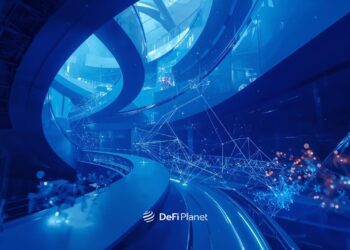What are Decentralized Prediction Markets?
Decentralized prediction markets are innovative platforms that leverage blockchain technology to enable individuals to bet on the outcomes of future events without relying on a central authority. These markets utilize smart contracts and decentralized oracles to ensure transparency, security, and trustless operations.
Participants can create and trade shares representing potential outcomes of various events, ranging from political elections to sports matches, with the market prices reflecting the collective belief about the likelihood of these outcomes.

How Decentralized Prediction Markets Work
Decentralized prediction markets operate in a structured process that take advantage of blockchain technology, smart contracts, and oracles to create a trustless and transparent environment for forecasting events. The process involves four key stages: market creation, trading, outcome resolution, and payout distribution.
Step 1: Market creation
The first step is market creation, where any user can initiate a prediction market by selecting a specific event and defining its possible outcomes. For example, a user may create a market predicting the winner of an upcoming election or the price of Bitcoin at the end of the month.
This user deploys a smart contract that encodes the rules of the market, including how participants can trade, the event’s resolution process, and how payouts will be distributed. In some decentralized platforms, market creators can also earn a portion of the trading fees as an incentive for setting up the market.
Step 2: Trading
Once the market is live, trading begins. Participants can buy and sell shares representing different possible outcomes of the event. The price of these shares fluctuates based on supply and demand, reflecting the collective belief of market participants about the likelihood of each outcome.
If a particular outcome becomes more probable based on new information or public sentiment, the price of its shares increases, while the price of less likely outcomes decreases. For example, if a “Yes” share in a market predicting a presidential candidate’s victory is trading at $0.70, it suggests that the market assigns a 70% probability to that outcome.
Some decentralized prediction markets use automated market makers (AMMs) to ensure continuous liquidity, allowing users to trade at any time without relying on centralized order books.
Step 3: Outcome resolution
After the event has taken place, outcome resolution is handled using decentralized oracles. Oracles act as bridges between blockchain-based smart contracts and real-world data sources. They fetch accurate and verified information from multiple sources, such as news agencies, government websites, or reputable third-party data providers.
Once oracles confirm the actual outcome of the event, the smart contract updates the market accordingly. Some platforms use a decentralized dispute resolution mechanism, where users can challenge incorrect outcomes and stake tokens to support their claims. This system helps ensure that market results are as accurate and unbiased as possible.
Step 4: Payout distribution
Finally, payout distribution is carried out automatically through smart contracts. Once the correct outcome has been verified, the smart contract releases funds to participants who held winning shares.
Since the entire process is decentralized, there are no intermediaries delaying transactions or taking a percentage of the winnings. Depending on the platform, payouts may be distributed in cryptocurrencies such as ETH, BTC, or stablecoins like USDC. This automation ensures that winners receive their earnings fairly and transparently, without the risk of fraud or manipulation.
Benefits of Decentralized Prediction Markets
Decentralized prediction markets offer several advantages over traditional, centralized platforms. Below are some key benefits that make decentralized prediction markets an attractive alternative.
1. Transparency and Trustworthiness
One of the most significant advantages of decentralized prediction markets is their high level of transparency. Unlike centralized platforms, where odds and payouts can be altered behind closed doors, decentralized markets operate in an open and verifiable manner.
Since all transactions, trades, and market activities are recorded on a public blockchain ledger, anyone can audit the data to ensure the integrity of the market. This eliminates the risk of manipulation by a central authority, ensuring that all participants have equal access to information.
2. Incentivized Information Sharing and Market Accuracy
Decentralized prediction markets encourage participants to share honest and well-researched insights by offering financial rewards for accurate predictions.
Since users can profit from correctly forecasting events, they are motivated to use reliable data and thorough analysis when placing bets. This self-regulating mechanism leads to more accurate market predictions, as collective intelligence often results in better forecasting than individual analysis.
Over time, these markets can serve as valuable tools for assessing public sentiment on various issues, including elections, financial trends, and global events.
3. Lower Transaction Fees
Traditional prediction markets and betting platforms often impose high fees to cover operational costs, payment processing, and regulatory compliance. However, decentralized prediction markets eliminate the need for intermediaries, significantly reducing transaction fees.
Smart contracts automatically handle trade execution, payouts, and market resolution without requiring third-party oversight. This efficiency allows users to keep a larger portion of their winnings, making decentralized markets more cost-effective than traditional alternatives.
4. Censorship Resistance and Unrestricted Market Access
Unlike centralized platforms that are often subject to government regulations and content restrictions, decentralized prediction markets operate on blockchain networks that are resistant to censorship. This means that anyone, regardless of their location, can participate in these markets without fear of government intervention or platform restrictions.
Users can create and trade on markets related to various topics, including political events, sports, financial markets, and technological advancements, even in regions where traditional betting platforms are heavily regulated or banned.
5. Fair and Market-Driven Odds
In traditional betting markets, odds are determined by bookmakers, who can adjust them to ensure profitability for the platform. This often leads to unfavourable odds for participants.
In decentralized prediction markets, however, odds are established purely through market dynamics. The price of each outcome is driven by supply and demand, reflecting the collective belief of all market participants. This fair and unbiased approach ensures that users receive the most accurate and competitive odds, potentially leading to higher payouts compared to traditional betting platforms.
Challenges and Limitations
While decentralized prediction markets offer numerous advantages, they also face several challenges that impact their adoption, usability, and long-term sustainability. Below is an in-depth look at the key challenges decentralized prediction markets must overcome.
1. Regulatory Uncertainty and Legal Risks
One of the most significant hurdles for decentralized prediction markets is the evolving and often unclear regulatory landscape. Many governments have strict regulations on gambling, financial markets, and blockchain-based activities, making it difficult for decentralized prediction markets to operate legally in certain jurisdictions.
Because these platforms do not have a central authority, enforcing compliance with financial laws becomes complex. This uncertainty may discourage institutional investors and mainstream users from participating, limiting widespread adoption. Additionally, some governments may impose bans or restrictions, leading to difficulties in accessing these markets in regulated regions.
2. Liquidity Issues and Market Participation
For a prediction market to function effectively, it needs a sufficient number of participants to ensure liquidity—meaning there must be enough buyers and sellers actively trading outcome shares. However, newer or niche markets often struggle with low participation, leading to low liquidity. This can cause significant price fluctuations and make it difficult for users to enter or exit positions at fair market prices. When markets lack liquidity, they become less reliable as indicators of public sentiment and may not accurately reflect the true probabilities of various outcomes.
3. Oracle Reliability and Risk of Manipulation
Decentralized prediction markets rely on oracles—external data sources that provide real-world information to smart contracts—to determine event outcomes. The accuracy and security of these oracles are critical to ensuring fair and correct payouts. However, oracles can be compromised, hacked, or manipulated, leading to incorrect outcomes being recorded on the blockchain.
If an oracle is controlled by a malicious actor or experiences a failure, participants may receive unfair payouts, damaging trust in the platform. To mitigate this risk, some markets use multiple oracles and consensus mechanisms, but this adds complexity and potential delays to the resolution process.
4. Technical Complexity and User Experience Barriers
While decentralized prediction markets offer innovative financial opportunities, they require users to have a certain level of technical knowledge to interact with blockchain-based platforms. Participants must understand how to use cryptocurrency wallets, trade using smart contracts, and manage blockchain transactions.
The complexity of these processes can be intimidating for non-technical users, limiting mainstream adoption. Additionally, transaction costs such as gas fees (especially on networks like Ethereum) can further discourage participation, particularly for small-scale traders who may find fees prohibitively high.
5. Security Risks and Smart Contract Vulnerabilities
Smart contracts are the foundation of decentralized prediction markets, automating transactions and payouts. However, these contracts are only as secure as the code they are built upon. If a smart contract contains bugs, loopholes, or vulnerabilities, hackers can exploit them to manipulate outcomes or steal funds. Unlike traditional platforms that have customer support and fraud protection mechanisms, decentralized markets often lack recourse in the event of a security breach. Users must trust that the smart contract code has been properly audited and is free of exploitable flaws.
Final Thoughts
As decentralized prediction markets continue to evolve, they offer the promise of more democratic and transparent forecasting tools. However, their success will depend on addressing current challenges, navigating regulatory landscapes, and enhancing user accessibility to realize their full potential.
Mainstream financial platforms are also recognizing the potential of prediction markets. Moreover, mainstream financial platforms are recognizing the potential of prediction markets. Robinhood’s CEO, Vlad Tenev, has referred to prediction markets as “the future,” indicating the possibility of integrating such features into traditional trading platforms.
While regulatory uncertainty, liquidity concerns, and security risks remain hurdles, ongoing innovation and adoption could help decentralized prediction markets become more widely accepted. As these platforms refine their infrastructure and attract broader participation, they have the potential to transform the way individuals and institutions engage with forecasting, market speculation, and decision-making.
Disclaimer: This article is intended solely for informational purposes and should not be considered trading or investment advice. Nothing herein should be construed as financial, legal, or tax advice. Trading or investing in cryptocurrencies carries a considerable risk of financial loss. Always conduct due diligence.
If you want to read more market analyses like this one, visit DeFi Planet and follow us on Twitter, LinkedIn, Facebook, Instagram, and CoinMarketCap Community.
Take control of your crypto portfolio with MARKETS PRO, DeFi Planet’s suite of analytics tools.”





















